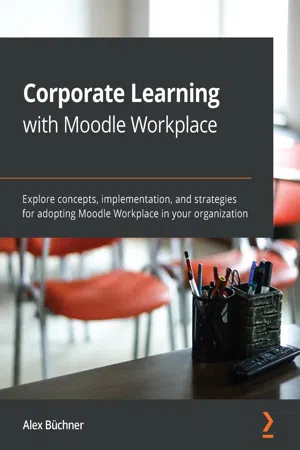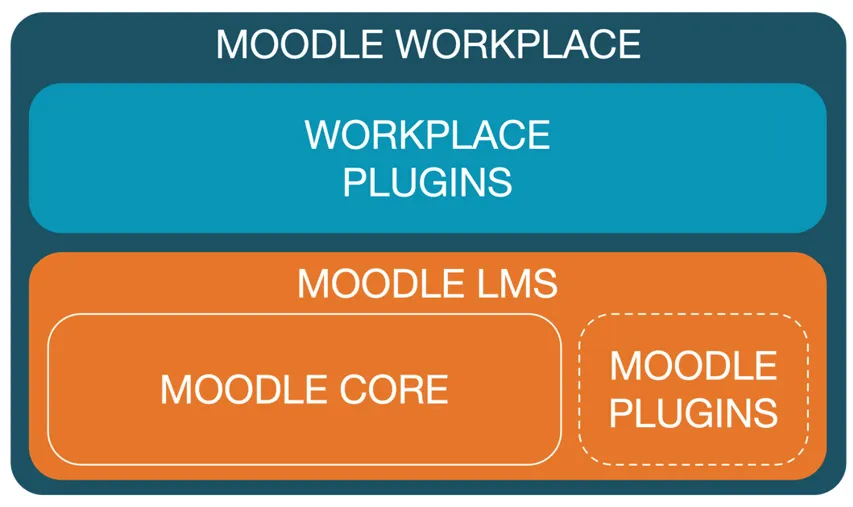
Corporate Learning with Moodle Workplace
Explore concepts, implementation, and strategies for adopting Moodle Workplace in your organization
- 358 pages
- English
- ePUB (mobile friendly)
- Available on iOS & Android
Corporate Learning with Moodle Workplace
Explore concepts, implementation, and strategies for adopting Moodle Workplace in your organization
About this book
Discover techniques and practices to bring learning and development in line with day-to-day operations for small and large enterprises through hands-on examples
Key Features
- Deliver effective training and professional development programs at the organizational level
- Automate various learning processes in your organization such as onboarding, compliance, and reporting
- Manage distance learning programs, online seminars, and assessments locally as well as globally
Book Description
Moodle Workplace is a comprehensive extension to Standard Moodle, the world's most used learning management system (LMS) platform, empowering millions of learners worldwide. Moodle Workplace is suitable for businesses and organizations, from small enterprises to global corporations.
Corporate Learning with Moodle Workplace is a comprehensive introduction to this latest product from Moodle, which facilitates collaborative learning in enterprises and larger teams. Complete with detailed descriptions, a variety of diagrams, and real working examples, this easy-to-follow guide will teach you everything you need to know to manage a Moodle Workplace system. You'll learn how to manage your users along reporting lines and organize them in to tenants, organizations, positions, job assignments, and teams, before setting up typical HR processes such as induction, compliance, and reporting. Filled with real-world examples, the book covers blended and offline scenarios, including appointments and the Moodle Workplace mobile app.
By the end of this Moodle book, you'll have learned how to fully manage a Moodle Workplace instance.
What you will learn
- Understand the Moodle Workplace business model
- Support multiple business entities using multi-tenancy, organizations, positions, job assignments, and teams
- Explore best practices for organizing typical HR processes such as onboarding, compliance, and reporting
- Automate business workflows using dynamic rules and migrations
- Support blended and offline learning via seminar management and the Workplace app
- Incentivize skill development and learning through certificates, competencies, and badges
- Customize Moodle Workplace to reflect an organization's corporate identity
- Familiarize yourself with Moodle Workplace Web services
Who this book is for
This book is for workplace administrators in a technical, organizational or pedagogical capacity. Managers who lead teams in the workplace, especially HR, will also find this book useful, as will learners who use Moodle Workplace for their continuous professional development. Prior exposure to the Moodle platform will help you follow the examples more easily.
Frequently asked questions
- Essential is ideal for learners and professionals who enjoy exploring a wide range of subjects. Access the Essential Library with 800,000+ trusted titles and best-sellers across business, personal growth, and the humanities. Includes unlimited reading time and Standard Read Aloud voice.
- Complete: Perfect for advanced learners and researchers needing full, unrestricted access. Unlock 1.4M+ books across hundreds of subjects, including academic and specialized titles. The Complete Plan also includes advanced features like Premium Read Aloud and Research Assistant.
Please note we cannot support devices running on iOS 13 and Android 7 or earlier. Learn more about using the app.
Information
Chapter 1: What Is Moodle Workplace?
- Introducing Moodle Workplace
- Comparing Moodle Workplace and standard Moodle
- Comparing Moodle Workplace and Totara Learn
- Understanding Moodle Workplace's business model
- Understanding Moodle Workplace versions
Introducing Moodle Workplace



Comparing Moodle Workplace and standard Moodle

Moodle Core or standard Moodle
Moodle plugins and Moodle LMS
- Office systems: For instance, Microsoft has developed a suite of plugins to allow Microsoft Office 365 usage within Moodle. This includes logging in via OpenID, access to OneDrive, integration with Office resources, and Outlook calendar synchronization.
- Web conferencing: Various commercial web conferencing suppliers provide plugins for their system to be used from within a Moodle course. Examples are WebEx, Zoom, and BigBlueButton.
- Video platforms: Streaming is a highly effective way to transport video content, which is already supported via basic integrations with YouTube and Vimeo. The Moodle functionality of the latter can be nicely enhanced using the popular Video Time plugin. Additionally, dedicated video platforms, such as Kaltura, also provide suites of plugins for smooth integration with Moodle.
Workplace plugins
Comparing Moodle Workplace and Totara Learn
- Totara Learn: An LMS for training and developmentTotara Learn is Totara's flagship product and has been the only serious contender among the open source Moodle LMS distributions...
Table of contents
- Corporate Learning with Moodle Workplace
- Why subscribe?
- Preface
- Chapter 1: What Is Moodle Workplace?
- Chapter 2: Working with Moodle Workplace
- Chapter 3: Exploring Moodle Courses, Users, and Roles
- Chapter 4: Tenants, Organizations, and Teams
- Chapter 5: Automation and Dynamic Rules
- Chapter 6: Onboarding and Compliance
- Chapter 7: Skills and Incentives
- Chapter 8: Generating Custom Reports
- Chapter 9: Seminar Management
- Chapter 10: Mobile Learning
- Chapter 11: Corporate Identity
- Chapter 12: Migrations
- Appendix A – Moodle Workplace Web Services
- Other Books You May Enjoy